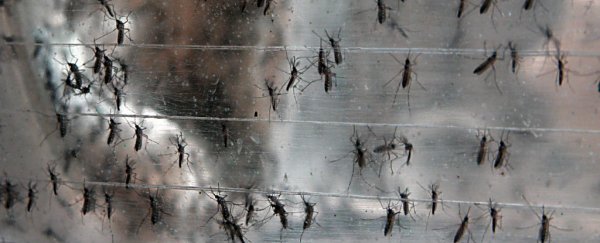Between 2014 and 2015, Brazil has seen the number of babies born with microcephaly - a rare and devastating neurological disorder that causes newborns to develop abnormally small skulls and brains - increase dramatically, from 200 to nearly 3,000.
Brazil's worst affected regions have declared a state of emergency, and health officials are drawing a link between the sudden increase in microcephaly, which can lead to severe brain damage and often death, and a recent epidemic of the mosquito-borne Zika virus. The Brazilian government estimates that around 1.5 million locals have been infected with the virus since May 2015.
Spread by Aedes aegypti mosquito bites, Zika virus usually only causes a mild reaction in children and adults, including symptoms such as an itchy rash, fever, and conjunctivitis. And that's if you're unlucky - most people make it through infection with no symptoms at all, which has led experts to refer to it as a "benign disease".
Unfortunately for the many pregnant women living in Brazil - who are now in a complete panic over the potential risk to their unborn children - it could be a completely different story when it comes to newborns.
Having identified Zika virus in the placentas of Brazilian children born with microcephaly, researchers now suspect that the two are somehow linked, but are yet to figure out exactly how one can cause the other.
"When the cases of microcephaly started to soar [in November 2015], doctors noticed they coincided with the appearance of the Zika virus in Brazil," CNN reports. "They soon discovered that most of the affected mothers reported having Zika-like symptoms during early pregnancy - mild fever, rash, and headaches."
According to The New York Times, Claudio Maierovitch, director of the department of surveillance of communicable diseases at Brazil's Health Ministry, has been advising women in the worst affected states to put planned pregnancies on hold if possible.
Named after the Ugandan forest in which it was first identified back in the 1940s, Zika virus has spread throughout Africa, parts of Asia, and more recently through Latin America, where it's been reported in countries such as Colombia, Mexico, Venezuela, and this week Puerto Rico.
What's so concerning about its appearance in Brazil is how incredibly fast it's been spreading throughout the population.
"Brazil offers the ideal conditions for Zika to spread so quickly," Ana Maria Bispo de Filippis, leader researcher in the team that linked Zika to microcephaly, told Simon Romero at The Times. She added that the country has "a susceptible population in which the majority of people never had contact with the disease".
The link is not yet certain though, due to the fact that two previous Zika virus epidemics in Micronesia and French Polynesia did not lead to an increase in microcephaly, and scientists can't figure out the physiological process by which the presence of the virus could lead to such a severe developmental disorder.
Akshat Rathi explains over at Quartz:
"An explanation for the link may be that a new strain of the virus is spreading through Brazil, according to Alain Kohl, a virologist at the University of Glasgow who studies Zika. Still, even for the fastest evolving organism on the planet, acquiring completely new powers of devastation is rare.
A more likely explanation is that the link has simply gone unnoticed so far. It may be that Zika-induced microcephaly occurs only in a small proportion of pregnant women, and none of the previous epidemics have affected a large enough population to raise an alarm."
For now, Brazilian locals and tourists visiting affected regions are being urged to remain hyper-vigilant about keeping mosquitos away from themselves and their homes, and federal and local governments are making an effort to eradicate stagnant ponds that could act as breeding grounds.
"This is an unprecedented situation, unprecedented in world scientific research," Brazil's Health Ministry announced in November.
